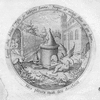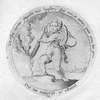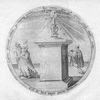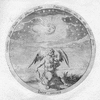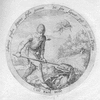Seró detrectat onus qui subijt [23]
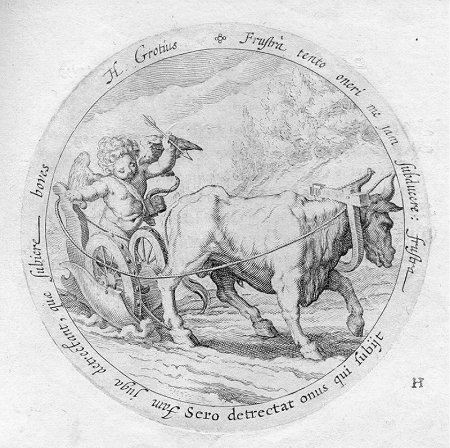
23.
Seró1 detrectat onus qui subijt.



Hier voortijdts als ick placht van minnen t’ hooren
spreken/
En van dat bitter soet end’ van die loose treken2/
My docht het was soo moy/ men coster uyt end in/
Dat heeft my eerst ghebroght het minnen in de sin.
Ick sach het jock3 wel aen/ maer ’t docht my licht te wesen/
Ghevlochten end’ ghebreyt van rooskens tsaem ghelesen4
Wt Venus5 gouden tuyn/ my docht ick was een man/
Maer als6 ick weet wat ’t is/ en can ick daer niet van.
En van dat bitter soet end’ van die loose treken2/
My docht het was soo moy/ men coster uyt end in/
Dat heeft my eerst ghebroght het minnen in de sin.
Ick sach het jock3 wel aen/ maer ’t docht my licht te wesen/
Ghevlochten end’ ghebreyt van rooskens tsaem ghelesen4
Wt Venus5 gouden tuyn/ my docht ick was een man/
Maer als6 ick weet wat ’t is/ en can ick daer niet van.

Translations
 |
Wie een last op zich heeft genomen, is te laat om hem nog te weigeren. |
 |
Who has accepted a burden is too late to refuse it. |
 |
Nu probeer ik me vergeefs van de last te bevrijden, zoals runderen zich vergeefs aan de last onttrekken die ze op zich hebben genomen. |
 |
Now in vain I try to rid myself of the burden, just as oxen in vain try to withdraw from the burden they have accepted. |
Literature
-
Henkel and Schöne, Emblemata
 , col. 1439
, col. 1439
-
Praz, Seventeenth-Century Imagery
 , p. 97
, p. 97
Sources and parallels
- Same emblem in 1601 edition: Serò detrectat onus qui subijt [23] (in: Daniël Heinsius, Quaeris quid sit Amor (c. 1601))
[Compare
![Compare [compare]](/static/images/compare2.gif) ]
]
- Source for the motto: Junius, Emblemata [web]
 , embl. 30
, embl. 30 - Source for the metaphor used in this emblem: Ovidius, Ars Amatoria
 , bk/l. II/184
, bk/l. II/184 - Source for the metaphor used in this emblem: Propertius, Elegiae
 , bk/ch/l. II/3/47
, bk/ch/l. II/3/47 - Parallel, probably adaptation, for the pictura: Pedetentim [14] (in: Otto Vaenius, Amorum emblemata (1608))
[Compare
![Compare [compare]](/static/images/compare2.gif) ]
]
- Parallel, via Vaenius' Amorum Emblemata: Nullus liber erit, si quis amare volet [40] (in: Otto Vaenius, Amoris divini emblemata (1615))
[Compare
![Compare [compare]](/static/images/compare2.gif) ]
]
-
Parallel in the 1616 edition: motto and subscriptio the same, pictura is mirrored: Serò detrectat onus qui subijt. [45] (in: Daniël Heinsius, Ambacht van Cupido, from: Nederduytsche poemata (1616))
[Compare
![Compare [compare]](/static/images/compare2.gif) ]
]
References, across this site, to this page:
- Serò detrectat onus qui subijt [23] (in: Daniël Heinsius, Quaeris quid sit Amor (c. 1601))
- Serò detrectat onus qui subijt. [45] (in: Daniël Heinsius, Ambacht van Cupido (1613))
- Serò detrectat onus qui subijt. [45] (in: Daniël Heinsius, Ambacht van Cupido, from: Nederduytsche poemata (1616))
- Pedetentim [14] (in: Otto Vaenius, Amorum emblemata (1608))
- Nullus liber erit, si quis amare volet [40] (in: Otto Vaenius, Amoris divini emblemata (1615))
Iconclass
Cupid raising his arrow at the bull pulling his plough- cultivated land
[25H18]

- archer's weapons: arrow
[45C15(ARROW)]

- reins
[46C131613]

- ploughing
[47I123]

- agricultural implements: plough
[47I15(PLOUGH)]

- ox (+ animal(s) pulling, drawing something)
[47I21111(+95247)]

- Custom, Habit; 'Consuetudine' (Ripa) (+ emblematical representation of concept)
[54D6(+4)]

- Pain, Sorrow, Sadness; 'Dolore', 'Dolore di Zeusi' (Ripa) (+ emblematical representation of concept)
[56BB1(+4)]

- (personifications and symbolic representations of) Love; 'Amore (secondo Seneca)' (Ripa) (+ emblematical representation of
concept)
[56F2(+4)]

- proverbs, sayings, etc. (with TEXT)
[86(SERO DETRECTAT ONUS QUI SUBIIT)]

- other non-aggressive activities of Cupid
[92D156]

- attributes of Cupid (with NAME)
[92D18(ARROW)]

![[H O M E : Emblem Project Utrecht]](/static/images/rd-small.gif)




